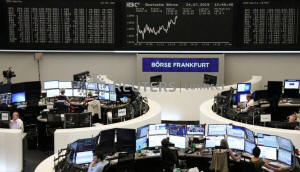ECB prepares some sub-zero relief for wilting Europe
 Send a link to a friend
Send a link to a friend
 [July 25, 2019]
By Marc Jones [July 25, 2019]
By Marc Jones
LONDON (Reuters) - The euro and bond yields
wilted on Thursday as a slump in German business confidence added to
pressure on the European Central Bank to push interest rates even deeper
into sub-zero territory later.
With the chance of a ECB rate cut now priced at about 50-50, the euro
was at a two-month trough [/FRX], German Bund yields were slipping back
towards record lows [GVD/EUR] and Europe's main stock markets shuffled
higher. [.EU]
New German data added to the call for ECB action as it showed business
morale there had hit its lowest level since April 2013.
The ripple effect saw bond yields bow across Europe. Neighboring
Switzerland's 50-year government bond yield even went negative, meaning
that none of its bonds now offer buyers any interest.
"The weak macro data this week means the ECB will be forced to act
sooner than later," said Daniel Lenz, a rates strategist at DZ Bank in
Frankfurt.

"The German economy is navigating troubled waters," Ifo President
Clemens Fuest added, saying companies there were increasingly concerned
about the outlook for their businesses.
Overnight it had been a happier story. Wall Street's S&P 500 and Nasdaq
had both hit record highs after reassuring comments from Texas
Instruments about global chip demand blunted the impact of weak earnings
from Boeing and Caterpillar. [.N]
Facebook also announced forecast-beating revenues, sending its shares
higher in extended trading after the closing bell.
The social media company's stock has surged over 56% so far this year,
despite warnings on future revenue growth from new data privacy rules
and forthcoming privacy-focused product changes.
Asia then managed to overcome some early wobbles to finish higher and
with some striking milestones.
Japan's Nikkei touched a near three-month high, although Australia stole
the glory as it ended near a 12-year peak after its central bank chief
stressed interest rates could continue to fall.
Chinese blue-chips also added 0.5% in Shanghai. Investors there looked
with hope to a meeting between top U.S. and Chinese negotiators next
week, even if there are few signs that it will produce real progress in
the two countries' trade war.
"Lower rates are generally, in a traditional, mechanical way, good news
for equity prices," said Jim McCafferty, head of equity research, Asia
ex-Japan, at Nomura.
[to top of second column]
|

The German share price index DAX graph is pictured at the stock
exchange in Frankfurt, Germany, July 24, 2019. REUTERS/Staff/File
Photo

TALKING TURKEY
For all the ECB focus, the day's real fireworks were already going
off in Turkey.
The country slashed its main interest rate to 19.75% from 24% in the
first rate meeting since President Tayyip Erdogan sacked the former
central bank chief for not cutting rates fast or furiously enough.
New governor Murat Uysal didn't waste anytime and the lira rose 0.3%
in response.
"The CBRT (Turkish central bank) had room for manoueuvre given real
rates are at 8%, and decided to front-load some of its expected
easing," said Standard Chartered economist Carla Slim.
"It likely deemed the global market and geopolitical backdrop benign
enough to give more weight to domestic issues. The risk is that
cutting too much too soon could unnerve markets."
Back among the major currencies, the dollar was down against the yen
at 108.07 and the dollar index, which tracks it against six major
currencies, barely budged at 97.757.
Sterling was broadly flat at $1.2475, after falling for several
sessions as market participants feared the looming possibility of a
no-deal Brexit under Britain's new prime minister, Boris Johnson.
"If talks between the UK and EU break down, the GBP could see
further losses," said Steven Dooley, currency strategist at Western
Union Business Solutions.
In commodities, U.S. crude added 20 cents to $56.08 per barrel while
Brent crude climbed 15 cents to $63.33.

The advance came amid Middle East tensions and a big fall in weekly
U.S. crude stockpiles, although the gains were curbed by a frail
demand outlook and increasing signs of slowing global economic
growth. [O/R]
Spot gold slipped 0.2% to $1,423.09 an ounce, short of last week's
peak of $1,452.60.
(Additional reporting by Saikat Chatterjee in London and Swati
Pandey in Sydney; editing by Jon Boyle, Larry King)
[© 2019 Thomson Reuters. All rights
reserved.]
Copyright 2019 Reuters. All rights reserved. This material may not be published,
broadcast, rewritten or redistributed.
Thompson Reuters is solely responsible for this content. |